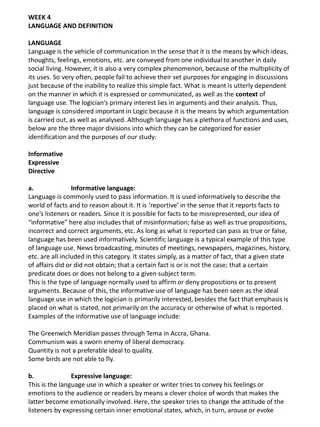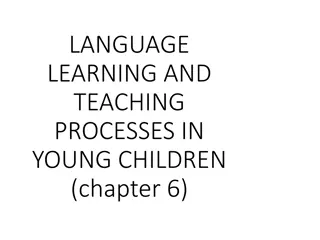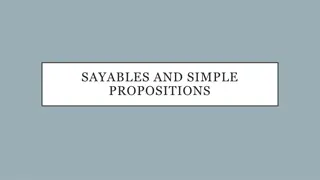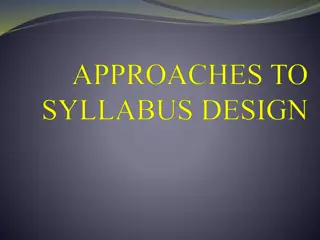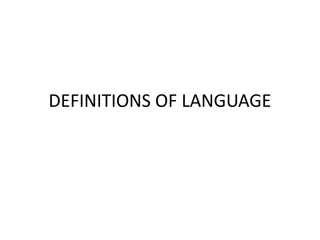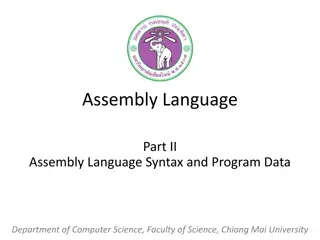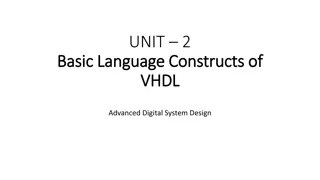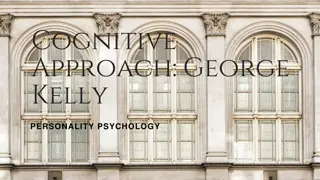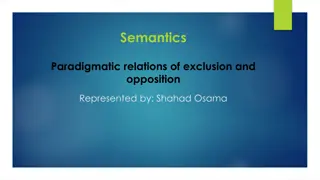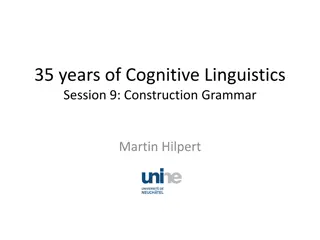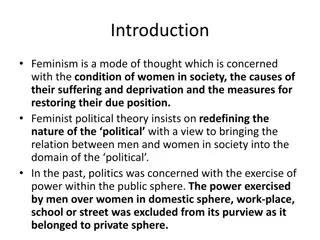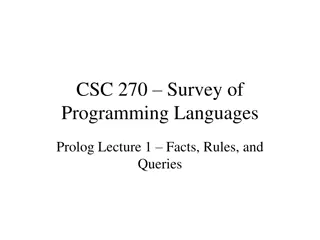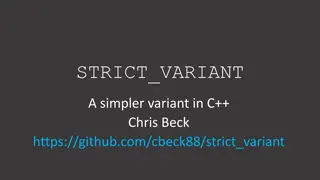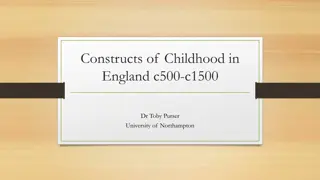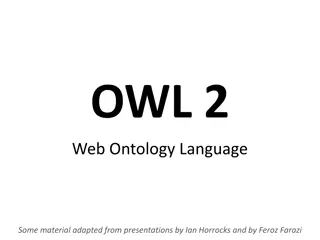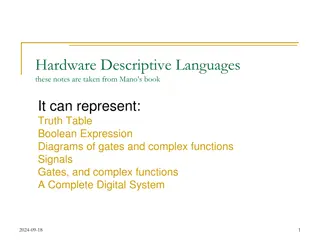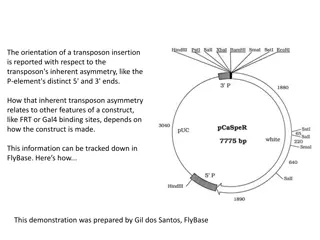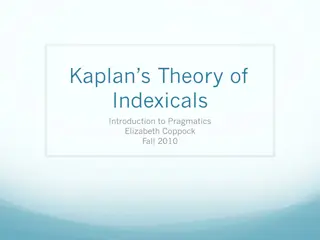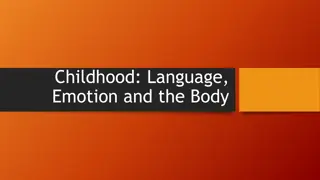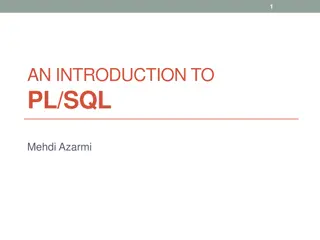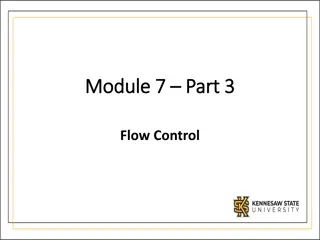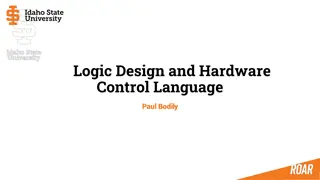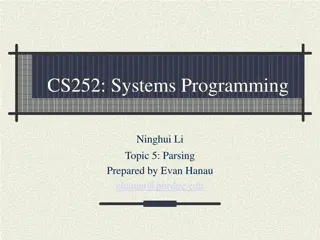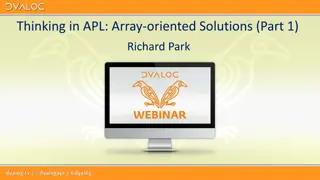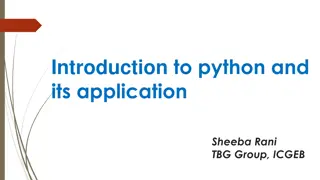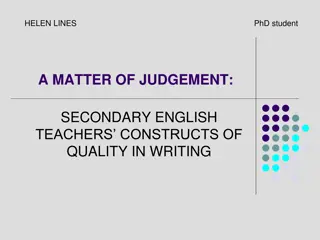Career Opportunities and Challenges in Translation & Interpreting Pedagogy Post-Pandemic
The APTIS 2022 conference explores new avenues in Translation and Interpreting (T&I) pedagogy amidst a changing landscape. Dr. Bego A. Rodriguez highlights emerging roles for T&I graduates. The context reveals a decline in language learning in the UK, impacting the Language Service Industry. The UK'
0 views • 13 slides
Language Study Community – Enhance Your Language Skills
Joining a Language Study Group is a fantastic way to take your language learning to the next level. By leveraging the power of Group Study, you can immerse yourself in the language, enhance your understanding, and build confidence in your speaking abilities. Read full article \/\/explainlearning.com
1 views • 3 slides
Academic Language Demands and Supports in Instructional Planning
Academic Language Demands and Supports are crucial in educational settings to ensure comprehension and usage of language by students. This content discusses embedding language demands in lesson plans, providing language supports, and peer review activities to enhance academic language skills. The fo
6 views • 10 slides
The Significance of Media in Language Learning
Media plays a crucial role in language learning by raising awareness of the ideology behind linguistic structures and providing valuable information on society and culture. Linguists are drawn to media language for research purposes and to understand its impact on language use and attitudes. Media s
12 views • 5 slides
Understanding Translation: Key Concepts and Definitions
Translation involves transferring written text from one language to another, while interpreting deals with oral communication. Etymologically, the term "translation" comes from Latin meaning "to carry over." It is a process of replacing an original text with another in a different language. Translat
11 views • 76 slides
Language and Communication in Society: Understanding Interactions
Explore the intricate relationship between language and society through lectures focusing on language in interaction, power dynamics, language contact and change, public space discourse, linguistic landscaping, and more. Delve into the shift from structural linguistics to societal communication, red
6 views • 28 slides
Understanding Language: Informative, Expressive, and Directive Uses
Language serves as a vital medium for communication, allowing the conveyance of ideas, thoughts, and emotions. It is a complex phenomenon with diverse uses. This text delves into the three major divisions of language use - informative, expressive, and directive. Informative language conveys facts, w
4 views • 6 slides
Language Learning and Teaching Processes in Young Children
Development of language in young children is influenced by various factors such as their cultural and linguistic environment, unique characteristics, and interactions with adults. Optimal language development requires language stimulation from the environment. Varied cultural practices impact langua
1 views • 51 slides
Understanding Language in Stoicism: Significance and Corporeality
Language in Stoicism plays a crucial role in the process of assenting to impressions by focusing on corporeality, reason, and truth. It distinguishes between the mundane vocal sounds, articulated speech, and significant language to convey meanings effectively. The significance of language lies not i
2 views • 13 slides
Understanding Language Teaching Syllabus: Integration, Theory, and Approaches
Language Teaching Syllabus involves the integration of subject matter and linguistic elements, guided by theories of language and learning. Various approaches like Grammatical, Situational, Communicative, and Analytic are used to structure syllabi. Breaking language into parts aids in sequential lea
1 views • 28 slides
Exploring Language and Communication Through a Short Film
In this lesson, students will watch a 10-minute short film titled "The Most Beautiful Thing" by Cameron Covell. They will reflect on the value of learning another language, analyze how facial expressions and body language convey emotions, and develop empathy towards those facing language barriers or
0 views • 29 slides
Various Definitions of Language Throughout Linguistic History
Different linguists and scholars have offered various definitions of language over time. Sapir (1921) emphasized language as a method of communicating ideas, emotions, and desires through voluntary symbols. Bloch and Trager (1942) focused on the social aspect of language as a system of vocal symbols
1 views • 12 slides
Introduction to Assembly Language Syntax and Program Data
Learn about the syntax of assembly language and how data, variables, and constants are used in programming. Explore the basic instructions and the translation of high-level language into assembly language. Discover the role of an assembler in translating assembly language programs into machine langu
4 views • 36 slides
Enhancing Language Learning Across the Curriculum in B.Ed. 1st Year Course
Language Across the Curriculum (LAC) emphasizes that language learning should occur across all subjects, not just in language classrooms. It highlights the importance of incorporating language development into every learning activity, fostering multilingualism in schools. Language plays a crucial ro
2 views • 34 slides
Understanding Basic Language Constructs of VHDL for Advanced Digital System Design
This content delves into the fundamental aspects of VHDL programming, covering topics such as skeleton syntax, entity declaration, port declaration, and architecture body. It explores the structure of VHDL programs, elements, data types, signal assignments, and the difference between combinational a
0 views • 19 slides
Understanding George Kelly's Personal Construct Theory in Personality Psychology
George Kelly's Personal Construct Theory explains how individuals perceive and organize their world by formulating and testing hypotheses, just like scientists. These personal constructs shape our unique views of events, influencing how we interpret reality and make decisions. Kelly's theory of cons
0 views • 23 slides
Exploring Gender Constructs in 'The Handmaid's Tale' and Society
Delve into the intricate themes of gender norms, sexuality, and social constructs in Margaret Atwood's novel "The Handmaid's Tale". Analyze key incidents, quotes, and characters to understand the portrayal of male and female roles. Reflect on how these concepts intertwine with societal expectations
0 views • 16 slides
Semantics and Paradigmatic Relations of Exclusion and Opposition
The presentation explores the concepts of incompatibility, co-taxonymy, and opposition in semantics. It delves into how certain terms exclude others within a set and the various forms of opposition such as complementaries and antonymy. Examples like "Women, Queen, Mother, Servant, Teacher" illustrat
0 views • 21 slides
Exploring Construction Grammar in Cognitive Linguistics Symposium
Delve into the realm of Construction Grammar with Martin Hilpert in the 35th year of Cognitive Linguistics. Discover the intricacies of idiomatic constructions, the distinction between constructions and constructs, coercion in neologisms, and more. Explore the relationship between Construction Gramm
1 views • 81 slides
Understanding Feminist Political Theory and Gender Constructs
Feminist political theory seeks to redefine politics by addressing the power dynamics between men and women. The distinction between sex and gender highlights how societal attitudes, influenced by patriarchy, shape gender roles and behaviors. These constructs serve as tools of social control, perpet
0 views • 14 slides
Speech and Language Developmental Milestones: A Bilingual/Multilingual Perspective
Speech and language developmental milestones are crucial for children, regardless of their home language. These milestones encompass receptive language, expressive language, pragmatics, and articulation and phonology. Understanding how a child hears and talks from birth to one year is essential, as
1 views • 23 slides
Introduction to Prolog Programming: Facts, Rules, and Queries
Prolog is a powerful logic programming language where programs are built around a knowledge base of facts and rules. It involves three basic constructs: facts (unconditionally true statements), rules (conditionally true statements), and queries to extract information. Creating a knowledge base, quer
0 views • 24 slides
Understanding Variants and Unions in C++
Variants and unions are essential concepts in C++ programming for managing heterogenous data and optimizing memory usage. Variants allow storing objects of multiple types in a single container, while unions provide a way to efficiently utilize memory by sharing the same storage space for different t
0 views • 26 slides
Childhood in England (500-1500): Legal, Social, and Cultural Constructs
Exploring the constructs of childhood in England during 500-1500, this historical account delves into legal definitions, marriage customs, and social norms that shaped the lives of children during that period. From legal responsibilities defined by age to marriage practices and societal expectations
0 views • 8 slides
Overview of OWL 2 Web Ontology Language Features
Introduction to OWL 2, its extension from OWL 1.1, and compatibility, new features based on real applications and use cases, adoption as a W3C recommendation in 2009, and the rationale behind features like syntactic sugar, new constructs, extended datatypes, and punning.
1 views • 63 slides
Understanding Hardware Descriptive Languages in Digital Systems
Hardware Descriptive Languages (HDLs) are used to represent various aspects of digital systems, including truth tables, Boolean expressions, gate diagrams, and complex functions. They find application in design entry, logic simulation, functional verification, circuit synthesis, timing verification,
0 views • 19 slides
Introduction to Language Technologies at Jožef Stefan International Postgraduate School
This module on Knowledge Technologies at Jožef Stefan International Postgraduate School explores various aspects of Language Technologies, including Computational Linguistics, Natural Language Processing, and Human Language Technologies. The course covers computer processing of natural language, ap
0 views • 27 slides
Exploring Sociolinguistics: Language Variation and Social Factors
Sociolinguistics delves into the study of language variation influenced by social factors, examining the relationship between language and its social context. It explores various aspects like standard pronunciation, language choice, speech acts, language components, language variety, and factors suc
0 views • 73 slides
Understanding Transposon Insertion Orientation and Its Impact on Gene Expression
This detailed guide explores the orientation of transposon insertions relative to their inherent asymmetry, like the P-element’s 5’ and 3’ ends, and how it influences constructs for driving ectopic gene expression. Using FlyBase resources, it explains the significance of orientation in constru
0 views • 5 slides
Understanding Assembly Language Programming for Computing Layers
Assembly language is a low-level programming language that enables direct interaction with a computer's hardware components. This content explores the fundamentals of assembly language, the relationship between human-readable machine language and binary code, an assembly language program for multipl
0 views • 31 slides
Understanding Kaplan's Theory of Indexicals
Kaplan's Theory of Indexicals explores the concept of indexicality in language, defining indexicals as words whose referents depend on the context of use. The theory distinguishes pure indexicals from demonstratives and emphasizes the directly referential nature of indexicals. By delving into altern
0 views • 30 slides
Insights into Childhood: Language, Emotion, and Society
Explore the intricacies of childhood through the lens of language, emotion, and societal constructs. Delve into the evolution of childhood perceptions, from Philippe Ariès' historical analysis to Willem Koops' examination of children as products of societal imagination. Discover how cultural norms
0 views • 25 slides
Understanding Language Anxiety in Foreign Language Learning and Teaching
Explore the impact of language anxiety on students and teachers in foreign language learning and teaching contexts through insights from Dr. Christina Gkonou's research. Delve into the theoretical background, implications for language education, and real-life experiences shared at the Essex Language
0 views • 25 slides
Introduction to PL/SQL: Oracle's Procedural Language Extension
PL/SQL is Oracle's extension to SQL, combining the power of SQL with the procedural constructs of a 3GL. This introduction covers the basics of PL/SQL blocks, block structure, variables and types, executable sections, and example variable declarations. It also highlights the features such as error h
0 views • 29 slides
Flow Control and Looping Constructs in Python and Java
Explanation on the similarities and differences between IF/ELIF/ELSE statements, Match vs. Switch statements, while loops, do-while loops, and for loops in Python and Java, highlighting syntax variations and unique features of each language's flow control and looping constructs.
0 views • 23 slides
Understanding Logic Design and Hardware Control Language
Exploring the fundamental concepts of logic gates, combinatorial circuits, HCL, TAPPS, multiplexors, and the differences between HCL and C language regarding Boolean expressions and circuit evaluation. Learn how HCL handles word-level signals and constructs word-level circuits.
0 views • 17 slides
Understanding Context-Free Grammars in Systems Programming
This insightful content delves into the world of context-free grammars, explaining their significance in parsing computer programming languages. It discusses the hierarchy of language classification, the limitations of regular expressions in expressing certain constructs like palindromes, and the ut
0 views • 31 slides
Exploring Array-Oriented Solutions in APL by Richard Park
Array Programming Language (APL) offers a powerful approach to problem-solving through array-oriented solutions. Richard Park delves into the intricacies of APL, highlighting its tools of thought, language primitives, and problem-solving techniques. The webinar covers the significance of notation as
0 views • 40 slides
Introduction to Python and its Applications
Python is a powerful, high-level programming language developed in the late 1980s by Guido van Rossum. Known for its readability and concise syntax, Python offers a range of features such as easy interpretation, object-oriented programming, and a large library. This introduction covers Python's hist
0 views • 69 slides
Secondary English Teachers' Constructs of Quality in Writing: A Study by Helen Lines, PhD Student
This study by Helen Lines, a PhD student, delves into the constructs of quality in writing as perceived by secondary English teachers. Through analysis of data and exploration of teachers' definitions of writing quality, the research tackles the challenge of externalizing the concept of excellence f
0 views • 20 slides






